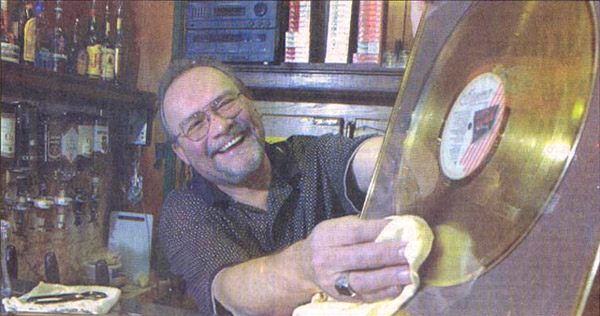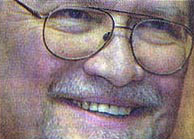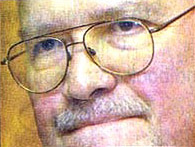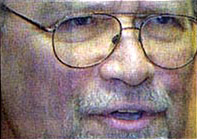
Procol HarumBeyond
|
|
|
PH on stage | PH on record | PH in print | BtP features | What's new | Interact with BtP | For sale | Site search | Home |
|
Procol Harum fans will recognise the name of John 'Polly'
Punter, who was propped up by Chris 'The Grouts' Michie according to the
liner-notes for Exotic Birds and Fruit. Many thanks to Canadian Paler George
Bertok who found this Punter interview in his local Peterborough Examiner,
December 2004.
GLORY DAYS
Sound engineer John Punter, co-owner of The Pig’s Ear, has worked with some of
the biggest names in rock
By Jean Greig, Examiner Staff Writer
[Photo caption: At the Pig’s Ear, John Punter dusts off one of the many gold records he was awarded during his 30-year career as a recording engineer and music producer.]
OK, rock ’n’ roll fans, time for a little musical trivia.
Anybody out there own a recording by Procol Harum, Nazareth, Roxy Music or John Cougar Mellencamp? How about Tom Jones or Engelburt Humperdinck? On the more recent side, try Sara Craig, the Rainbow Butt Monkeys, Hadrian’s Wall or Earthboy?
Chances are, if you have purchased popular music over the past 35 years, somewhere among the liner notes on one of more of your albums you will find the name John Punter. He’s a recording engineer and music producer who worked with dozens of well-known bands and solo artists all over the world during his 30-year career in the music business.
The other place you will encounter that name is behind the bar at the Pig’s Ear Tavern in downtown Peterborough [Canada].
They are the same man.
 |
At the Pig’s Ear, John Punter dusts off one of the many gold records he was awarded during his 30-year career as a recording engineer and music producer |
Punter, 55, is short and a bit squat, with a wide face and glasses sliding down his nose. His London accent is broad, his smile welcoming and his laugh infectious. Sitting at a table in the brightly-lit Pig’s Ear, he seems closer to a middle class Brit stopped in for a pint on his way home from work than a veteran of the glam years of rock 'n’ roll.
Middle class Brit does indeed describe Punter’s roots. He grew up in North London, an only child and an average student in England’s public school system. He played French horn for four years in school, then took up drums when his interests started to drift toward rock 'n’ roll.
He had just finished the British equivalent of high school and was playing drums semi-professionally when he discovered the vocation that would define his life.
One of Punter’s bandmates worked at a London studio as a “tape op,” an entry-level go-fer who operated the tape machines, set up microphones and made tea and coffee for the engineers. Through him, Punter got the chance to sit in on a recording session.
The man running the board was Ken Scott, a recording engineer who went on to become the producer for Supertramp, among other bands. Watching Scott at work, Punter saw his own future.
“It was like a thunderbolt,” he ways. “I knew this was the job I wanted to do.”
In those days, there were only eight recording studios in London, six of them owned by the major record labels. Someone pretty much had to die for a job opening to materialize, Punter says, only half in jest.
Determined, he sent out letters anyway.
It took a year, but in the spring of 1967 Punter got a call from Decca Studios. The studio’s chief engineer had decided to go freelance. With the top engineer gone, everyone moved up and there was a slot at the bottom. Punter got it.
His rise from there was nothing short of meteoric. From the lowly position of tape op, Punter moved quickly into recording demo tapes on weekends. Within a year, he had been promoted to engineer and was working with many of the label’s newest bands.
The musicians moving through Decca at the time were a veritable who’s who of the exploding music scene. And though most people would not recognize their names, the recording engineers and producers working there were just as influential a [sic] the artists themselves.
 For
a young engineer on the rise, it was a fantastic opportunity to learn from the
best in the business.
For
a young engineer on the rise, it was a fantastic opportunity to learn from the
best in the business.
“My engineering mentor was a gentleman named Bill Price, who has worked with everybody,” Punter says. “The Pretenders, The Sex Pistols – you name it, he’s done it.”
Price left Decca to join the brand-new Air Studios, co-owned by Beatles producer George Martin. Six months later, Punter got a call from Price saying he’d arranged for the young engineer to have an interview with Martin. Would Punter be interested in joining the new studio?
He got the job, and at age 20 became the “young rock engineer” at the newest, most prestigious and most technologically-advanced recording studio in the world.
Air Studios was built three floors above London’s Oxford Circus on a floating spring pad to protect against the rumble of the subway and the roar of traffic. There, Punter recorded and mixed the music of such bands as The Hollies, The Strawbs, Al Kooper, Procol Harum, Focus, and the Climax Blues Band.
Eventually Punter moved into producing and went freelance. The list of bands he worked with is dizzying: Bryan Ferry, Roxy Music, Nazareth, Japan, Reflex, Sad Café, The Boomtown Rats, The Tourists (precursor to the Eurythmics), The Spoons, Slade, Berlin, Triumph, Glass Tiger, The Kings, Sara Craig and Lori Yates, to name just a few.
Many people might at this point start wondering about the lifestyle. You know – sex, drugs and rock ‘n’ roll?
“There’s not really any smut,” Punter contends, then grins. “Not that I would tell, anyway.”
More seriously, Punter says the bands he worked with were dedicated and worked hard to create a good product.
That said, he still had a lot of fun. One of Punter’s favourite recording locations was in the Air Studios facility on the Caribbean island of Montserrat.
“You could sit at the console and watch the sunset,” he remembers. “There was this huge picture window that overlooked the pool area and then down to Viewpoint Bay. You’d sit there looking at the sunset, saying: “Oh, my God!”
Punter spent three months at Montserrat with the band Nazareth, “Probably the funniest three months of my life.” Each day at sunset they’d take a break, go down to the pool, have a drink or two, watch the sun descend into the ocean and head back to work.
Sadly, the studio was destroyed by the volcanic eruption that decimated the island in 1997.
Working smack in the middle of the glam rock era, Punter saw some pretty outrageous get-ups on the bands he worked with. Roxy Music, for whom Punter engineered and mixed three albums and produced a fourth, was one of the most memorable.
“The day they walked into the studio I will never forget, because they were all in full stage gear,” Punter recalls. “Brian Eno was in the band then, and his hair – he had this sort of mop – went from jet black through every colour of the rainbow around his head to silver blond. He came in with a feather boa and this big fur coat thing.” Punter shakes his head, laughing still.
“Bryan (Ferry, whose solo albums Punter went on to produce) was immaculate in black like he always was. I was gobsmacked.”
For all the glitz and glam surrounding him, Punter maintained a level of professionalism and a work ethic that his artists respect to this day.
One of the groups Punter produced was the British band Reflex, whose song The Politics of Dancing was a huge hit in the mid-1980s. John Baxter, lead singer and guitar player from the band, can’t say enough about how Punter’s attitude shaped him not only then, but today.
“He was capable of sitting there and allowing you to get what you wanted from yourself,” Baxter says about their recording sessions. “He wanted us to be ourselves. He relished seeing people being themselves. That was the first time I had come across that, somebody who didn’t want us to be like someone else.”
Baxter now lives in Los Angeles and works with up-and-coming musicians. He says that Punter’s approach all those years ago influenced how he now works with young artists. “He taught me about caring for people, for their musicality, for their creativity. So many record companies are trying to make artists into something else, so they can make money. But if you are going to entertain, you’d better be yourself. No one else can be you.”
Punter could “slam a table when he needed to,” Baxter says, but that was very rare. “He exuded this wonderful calming presence, but also a sense of control. He was very patient.”
Punter’s technical colleagues, too, hold him in high regard. “John has amazing ears, he can hear things others can’t,” says Alex Andronache, long-time manager of Metalworks studio in Toronto where Punter did a lot of his work after moving to Canada.
“He was of the less-is-more school of production,” Andronache explains. “Instead of using a lot of effects, he just made what was there sound pleasing to the ear. To this day, a lot of his work still holds up.”
 Punter
was mid-career when he and his wife, Lee Ryder, met in 1981. Lee and some
friends had driven down to Pittsburgh from Ontario to see King Crimson in
concert. Punter was there on tour with Nazareth. The two bands, both British,
were staying in the same hotel and Lee ended up at the post-concert party.
Punter
was mid-career when he and his wife, Lee Ryder, met in 1981. Lee and some
friends had driven down to Pittsburgh from Ontario to see King Crimson in
concert. Punter was there on tour with Nazareth. The two bands, both British,
were staying in the same hotel and Lee ended up at the post-concert party.
“We’ve been together ever since,” John says happily, divulging no further details.
They lived together in England for seven years, then moved back to Ontario where Punter continued to work in the recording business. But other responsibilities began to tug at the couple. Lee’s parents, Bill and Marg, had owned and managed the Pig’s Ear since 1974 and were ready to phase out of the business. Wanting keep the establishment in the family, Punter and Lee agreed to take over management in 1996. In 2000, they purchased the bar.
Punter’s last recording project was in the spring of 1997. His reasons for getting out of the business were mixed.
For one thing, owning and managing a bar is a full-time responsibility, Punter explains, and he felt it would be unfair to “just bugger off on a project and leave Lee running the fort.”
But it may have been a good time to get out. “The whole process of recording is not like it used to be, when you had to go to a studio that was acoustically designed to capture your performance and art,” Punter says.
“Now you can record in your basement, and very nicely too.”
Music downloading has taken its toll too, Punter believes. “Artists, writers, producers, record companies aren’t making the money from legitimate sales of products. That filters down into the record companies not having big enough budgets to hire producers and engineers.”
Andronache suggests some more personal reasons for Punter’s departure from the music scene. “I think he realized it was becoming a young person’s game,” he says. “John didn’t have anything to prove anymore.”
Changing priorities had a lot to do with it, too. “John’s always been very in love with Lee,” Andronache says. “That and family started to define his life a lot more than working with young, ungrateful rock and roll bands.”
After 30 successful years in music, Punter deserves to rest on his laurels. And he is enjoying the bar business.
“It can be stressful, it can be annoying, it can be frustrating,” he admits. “But basically, we’re really lucky here. We’ve got a great little bar that has a lot of character. It holds a lot of memories for people.”
“Every year at Head of the Trent we have kids coming back to see us,” he says. “I think they are relieved and delighted to find we are still here.”
These days, Punter and Lee share responsibilities at the bar and make sure they both get some time off.
During the summer, Punter plays golf once a week. Lee goes horseback riding. They both love to dive, and each winter take a holiday someplace where the weather is warm and the diving spectacular.
And now a word to any musicians out there dreaming of having Punter’s name on their next album: don’t get your hopes up. He’s been approached, and he’s not biting.
“I’m not trying to be big headed,” Punter says, “but in honesty, I’ve told them it’s going to take a lot more than their project to get me out of retirement.”
And if Bryan Ferry or Roxy Music called and asked him to work on their next album?
He grins and shrugs helplessly, “I’d be there.”
Q&A
Do you have a favourite book?
The book I’m reading right now is Caddy for Life: The Bruce Edwards Story,
by John Feinstein. He was Tom Watson’s caddy and he died of Lou Gehrig’s
disease this year.
 What
kind of music do you like to listen to?
What
kind of music do you like to listen to?
My record collection is so diverse, it ranges from classical stuff to
heavy metal. But I very rarely listen to music anymore. Most of my music
listening these days is at the jukebox.
If you could have any meal prepared for you, what would
it be?
Seafood and fish are my favourites. Lobster, shrimp, crab…
If you could spend an hour talking with anyone, who
would it be?
I picked four people, all of them dead unfortunately. John Lennon, the
only Beatle I never managed to meet. Both with and without the Beatles, he was
such a monumental force. Jimi Hendrix, who is still to this day my favourite
guitarist of all time. Gustav Holst, who composed The Planets Suite, the
most emotional piece of music for me, by far my favourite. And Jacques Cousteau.
I used to love his show. I’d love to ask him how he ever came up with the idea
of the aqualung.
(Thanks, Jill, for all the typing)
More Musicians and significant others at BtP | A similar, later piece
|
PH on stage | PH on record | PH in print | BtP features | What's new | Interact with BtP | For sale | Site search | Home |